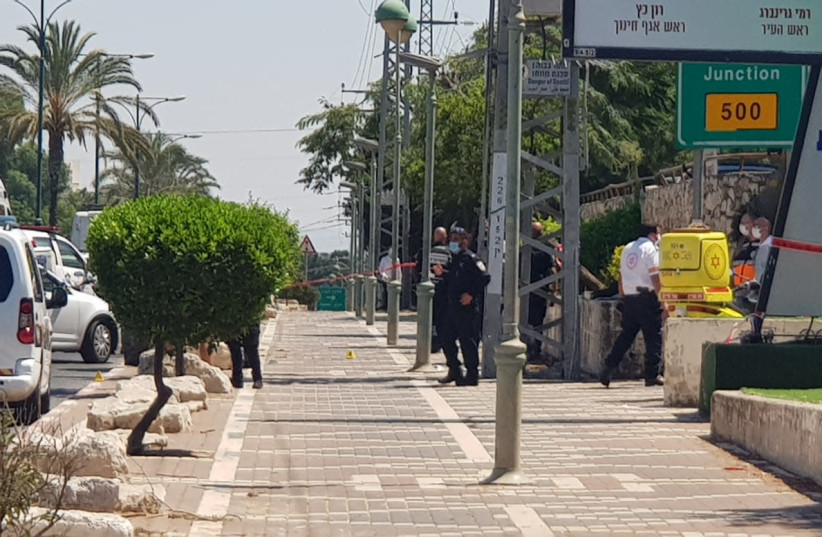 Petah Tikva stabbing attack is a reality check for Israel – analysis
Petah Tikva stabbing attack is a reality check for Israel – analysis
HERB KEINON
Despite everything, a tenuous security situation remains a permanent feature of Israeli reality. It is our evergreen.

Within the span of 24 hours beginning mid-Tuesday afternoon, 39-year-old Shai Ohayoun, a father of four, was stabbed to death on the streets of Petah Tikva by a Palestinian from Nablus; IDF soldiers patrolling the Lebanese borders came under fire from Hezbollah and hit back against Hezbollah observation posts; inflammable balloons from Gaza continue to set fire to fields near the border fence, something that over the last week has triggered nighttime IDF action against Gaza.
All of that has served as a painful reality check.
Despite everything – despite the recent normalization of ties with the United Arab Emirates and all the promise that holds with other Arab countries, despite the coronavirus fundamentally altering all aspects of society, despite the unending political machinations – a tenuous security situation remains a permanent feature of Israeli reality. It is our evergreen.
At any given time, one of the country’s borders could explode or a terrorist attack could “succeed” and all those other issues that dominate the news and seem so important at the movement – from coronavirus to the political infighting to the protests against Prime Minister Benjamin Netanyahu – will to many suddenly seem inconsequential.
The events of the last day are a stark reminder of where we live and what the country is up against. No one should fool themselves; the normalization treaty with the UAE is great, the coronavirus has tamped down points of friction between Hamas and the IDF, but this corner of the Middle East has not suddenly morphed into some peaceful oasis.
And that realization provides important context to understanding Israel.
Outsiders gazing into this country can be excused for wondering how it is that Netanyahu continues to rule the country, despite the animosity of a significant part of the population toward him, his wife and his oldest son; despite his being currently on trial for bribery, fraud and breach of trust; and despite an economy that – as a result of the coronavirus – is reeling.
How does that happen? How is it possible?
Then there are incidents like those between Tuesday and Wednesday that serve as an explainer: security.
Netanyahu has overseen a period when most Israelis – though not those living near the Gaza border – have felt a high degree of personal security. Netanyahu has not led the country into any major wars, and terrorism – notwithstanding the horrific attack on Wednesday – is way down during his long tenure.
The security secret of Netanyahu’s success has been overshadowed over the last few months by everything else, but it still goes a long way toward explaining why polls show that if elections were held today, the prime minister would still out-poll any rival.
The Blue and White Party tried three times over the last year and a half to out-security Mr. Security by putting three former chiefs-of-staff at the head of their list, and still could not pry Netanyahu loose from his hold on the prime minister’s office.
For many Israelis, the question of who should govern can be reduced to one overriding factor: Who can best keep me and my family safe?
Paradoxically, Wednesday’s stabbing attack served to remind people that it has been a long time since they have turned on the radio to news about a terror murder. Yes, there have been attempted stabbing attacks, but to hear the news begin with an account about a citizen murdered by a terrorist has not happened for over a year, since 17-year-old Rina Shnerb was murdered near Dolev on August 23, 2019.
Israel has gone 12 months without a civilian terror fatality. During this period, a soldier – St.-Sgt. Amit Ben Yigal (21) of Ramat Gan – was killed by a rock thrown at him while on an arrest operation in the West Bank village of Ya’bad. According to KAN’s Carmel Dangor, the last time Israel went 12 months without a civilian terror fatality was in 1964. But during that period, she noted, Israel lost 106 soldiers.
While at first glance, this counting of terror fatalities and the months between attacks may seem insensitive and nothing less than macabre statistics, those figures go far in explaining why Netanyahu has been able to retain power for so long.
Zawartość publikowanych artykułów i materiałów nie reprezentuje poglądów ani opinii Reunion’68,
ani też webmastera Blogu Reunion’68, chyba ze jest to wyraźnie zaznaczone.
Twoje uwagi, linki, własne artykuły lub wiadomości prześlij na adres:
webmaster@reunion68.com
